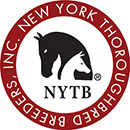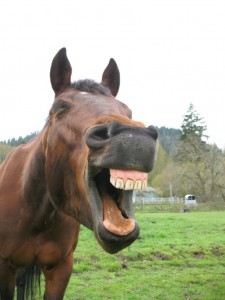Believe it or not we had a request from one of our readers. He wanted us to discuss the details of setting up a breeding operation as a business. For this discussion I called upon a client and friend of mine, Mr. Andre’ Moglia, to help outline and detail the ways to properly run farming or breeding as a business and why you should do this. We will also touch on some of the advantages of having things properly accounted for when tax time comes around.
Andre’ is one of my Parting Glass Racing clients, is a regular guest speaker and the accounting expert at our New Owner’s Luncheons sponsored by NYRA which are held throughout the year. As a horse owner he is well versed in horse ownership accounting from different aspects of the ownership process. Andre is a Certified Public Accountant/ M.S. Taxation, a Partner in Moglia & Company, CPA’s in Fishkill, NY and represents numerous clients connected to horse racing. In horse racing he has been a spectator most of his life and an owner for the last 14 years.
Andre’ we all want the beautiful, bucolic setting of horses grazing in wide open grassy fields. As we sit upon our majestic steed with a 10-gallon hat complete with John Wayne aspirations we all want to ride off into the sunset after rounding up our little dogies. So we don’t have the IRS chasing us into the sunset, hog tying and wrangling us into the hoosegow how should we begin to approach and apply proper accounting and book keeping practices to our breeding farm or broodmare ownership business?
Well, Tom, lets start with how to structure the farm and the business. I almost always recommend placing any business in a separate entity, which limits liability such as a corporation or an LLC. For those that aren’t familiar with these types of entities, their attraction is that they limit any potential liabilities against the owners to the assets of the entity rather than having everything the owner has be at risk. This protects the owner’s personal property as well as any other businesses they might own from the liabilities of the farm operation. Once a separate entity is established, it is important to keep detailed accurate records for everything that pertains to that entity and to keep those records separately from their personal finances as well as any other business they may own.
Lets start with people who own or want to own a farm. What would be the proper way to set things up from a bookkeeping and liability perspective?
In the case of someone who owns a farm or wants to purchase a farm, I generally advise clients to separate the real estate ownership from the farm operation using two separate entities. I prefer LLC’s for the real estate ownership and either LLC’s or corporations for farm operations.
Although legally there is only one type of corporation, for tax purposes there are two different types of corporations. Traditional corporations are known as “C” corporations and pass through corporations, often used by small businesses since there is a 75 shareholder limit, known as “S” corporations.
“C” corporations pay their taxes at the entity level, meaning the corporation itself is taxed while “S” corporations pass their profits or losses through to their shareholders who then report the results on their personal tax returns. Most of the time if a farm operation or race horse operation chooses to be a corporation, it will chose to be taxed as an “S” corporation. However, there are cases where it may be more advantageous to be taxed as a “C” corporation. The decision to be an LLC, “C” corporation or “S” corporation would depend on the facts and circumstances of each case. No matter what form of entity is chosen, as I stated earlier, bookkeeping records must be maintained separately for each entity and must be detailed and accurate. It is important to show the IRS that you are conducting the farm operation in a professional businesslike manner. I will cover this in a little more detail later.
In owning a farm you don’t automatically qualify for agricultural exemption. What requirements are there to qualify and what deadlines apply?
You are right; there is no automatic qualification for an agriculture exemption. In New York State, you must complete an agricultural exemption application, Form RP-305. To qualify, you generally must have at least 7 acres of land and generate at least $10,000 of gross income annually. To be clear, gross income means the total amount you take in from farm operations. It does not mean the net profit from the operation. If you have fewer than 7 acres, you may still qualify if you generate gross income of $50,000 or more. There are also exemptions from any increase in assessed value related to new or reconstructed agricultural buildings for up to 10 years as long as the structure continues to be used for agriculture. Again, this is the exemption for New York State. The exemption may vary from state to state. The deadline for filling agricultural exemption forms in NY State is March 1.
We hear a lot about depreciation. What does that mean and what are the different depreciation schedules for different classes of horses?
Depreciation in the confines of the tax code is an attribute which allows a taxpayer to deduct the cost of a capital outlay used in the operation over a period of time. Generally, when a taxpayer purchases an asset with a useful life of more than one year, they are not permitted to deduct the entire cost in the year they purchase it. The cost must be deducted over a period prescribed by the IRS.
Present law allows a taxpayer to depreciate race horses over a three-year period. All other horses, including broodmares, are depreciated over seven years. Most farm equipment is depreciated over either five or seven years. Some improvements are depreciated over seven to fifteen years, while farm buildings are depreciated over 39 years.
Also under present law, there are two other depreciation options that pertain to new equipment including livestock. They are bonus depreciation and Internal Revenue Code (IRC) Section 179 depreciation. Under bonus depreciation, a taxpayer may elect to depreciate 50% of the cost of new assets placed in service during the year and apply regular depreciation to the remaining 50%. Under IRC Section 179, a taxpayer may elect to depreciate the entire cost of an asset placed in service during the year. This special section is limited to $500,000 of assets in any given year provided the total asset purchases don’t exceed $2,000,000. It is important to note that a taxpayer is not allowed to create a net loss by using IRC Section 179. However, regular depreciation and bonus depreciation can create a net loss.
For farm owners who have horses they are bound to have losses. How do we treat the losses and can they be accumulated and rolled forward to years where a farmer may have gains.
There are two issues to be aware of when it comes to farm operation losses. First is the issue of the non-deductibility of hobby losses. Second is the issue of Passive Activity losses.
As to hobby losses, the IRS prohibits a taxpayer from deducting, at any time; a loss, which is the result of what they feel, is the taxpayer’s hobby. The IRS tends to be very aggressive in attempting to assert that an activity the taxpayer is engaged in is, in reality, their hobby. “Gentlemen” farming and horse racing activities are two areas that the IRS watches closely. That is why as I mentioned earlier, it is extremely important to conduct your farm operation in a professional and businesslike manner. The IRS uses a 9 prong test to determine if an activity is, in their eyes, a hobby. While I won’t go into to all of them, the most important ones are:
- Does the activity have a profit motive?
- Is there an expectation that the assets will appreciate in value?
- Can the taxpayer demonstrate that either they are proficient in the industry or they have sought the advice of, and/or hired a professional to assist them?
- Is the activity conducted in a businesslike manner including adequate record keeping and the use of a separate checking account?
- Has the operation shown a profit in 3 of the last 5 years or in the case of horse racing, 2 of the last 7 years? If not is there a valid reason which prevented it from doing so?
The IRS will look at these in aggregate so failing one is not necessarily fatal.
The Passive Activity issue relates to the timing of deducting losses. Assuming a taxpayer escaped the hobby loss trap, the IRS looks at the amount of time a taxpayer spends on a venture. The IRS categorizes all ventures into either Active Participation ventures or Passive Participation ventures. There are various definitions for the term “Active” depending on whether this venture is the only business venture of the taxpayer or they have other business ventures. The importance of this is that if the venture is categorized as Active, a taxpayer may deduct any losses from it in full against their other income. However, if the venture is considered Passive a taxpayer is very limited in the amount of loss, which can be deducted. A taxpayer may only deduct losses from a Passive activity against profits from other Passive activities, or rental profits provided they are not claiming they are real estate professionals for tax purposes. It is very possible that a taxpayer may not be able to deduct any of their Passive activity loss in the year it is incurred. If that is the case, the loss may be carried forward to a year in which the taxpayer does have profits from their farming venture or other passive activities. In the event that a taxpayer never has a future profit to deduct the losses against, the losses are accumulated until the year in which the venture that generated them is disposed of. It is in that year that all of the accumulated losses may be deducted.
For a horse owner who does not have a farm but still has to keep track of board, vet, blacksmith and vanning bills just to mention a few, what is the best method to track all these expenses and make sense of the all these charges?
If someone is a horse owner but does not own a farm, they should still follow the same path as discussed earlier with regard to using a separate entity LLC or corporation and maintaining detailed books and records. Regardless of whether a taxpayer owns real estate, I can’t emphasize enough the importance of demonstrating to the IRS that they are treating the venture as a business.
If someone owns racehorses, for example, they may have every horse owned by one entity. This is not uncommon but it may be worth considering having an LLC for each horse with a “parent” LLC owning all of the race horse LLC’s This concept is not for everyone but it does afford two advantages. As discussed earlier, it limits liability to just the one horse rather than putting every horse in the stable at risk. Also, it eases transferability of a particular horse. In a case where an owner wishes to transfer a percentage of one horse in their stable to someone, it is easy to transfer a piece of the LLC that owns it. If all the horses are in one entity, that is very difficult. If a horse owner is starting a syndicate, I definitely recommend a separate entity for each horse.
Tom, in closing, I want to make it clear that most of these issues we are discussing are much more complicated and involved than what we can cover here. I have given you a general overview. I would stress that it is critical for anyone who is involved or planning to get involved to consult with a competent advisor concerning all of these topics. Each situation is different. There is no “one size fits all” when it comes to any venture. As always, it is a pleasure working with you. Thank you for the opportunity to share some of the “how’s and whys” of farm and horse ownership. It is a complicated arena but it can be successfully navigated with the proper advice.
Thank you Andre for your time and I am sure the information you have provided will be helpful to many breeders and owners out there and to those who are looking to get into the business.
Watch for more helpful interviews and save the date for our next live Educational Seminar on April 30 at the Fasig-Tipton pavilion! If you have any questions for Mr. Moglia or comments, questions, feedback or suggestions for future dialogue, feel free to email them to info@nytbreeders.org.











Hi Tom: Thank you so much for this article. It is great to know that this organization listens to its members comments/suggestions/feedback and we appreciate that. Great series!